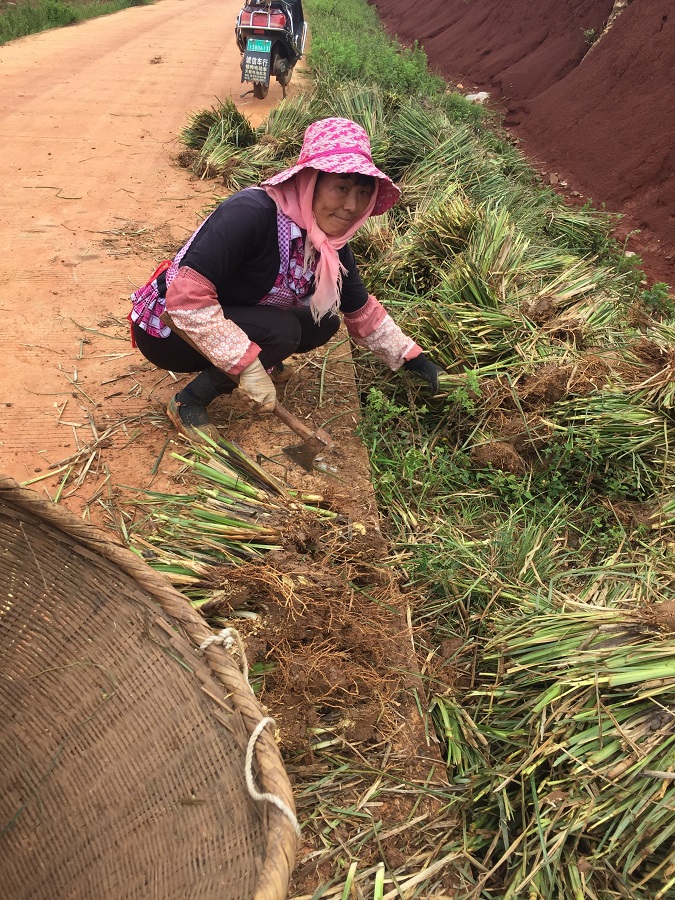Home \ Project News \ Farmers in Xundian Are Mobilized to Plant Vetiver Grass
Vetiver grass, a native plant of India is a type of perennial grass with far reaching roots and tall densely tufted grass blades. It has many uses but it is primarily known for its effectiveness in preventing soil and moisture loss. Vetiver grass is used for the control of erosion worldwide. As part of promoting sustainable land management the project team introduced the planting of vetiver grass as a way of preventing soil erosion caused by runoff water.
In July the project started preparations for planting and purchasing of vetiver grass. During the same time the project team also mobilized farmers to plant vetiver grass but unfortunately precipitation was too much. Niulan river was flooded and most of the slopes along the river were submerged in water so the planting was postponed to August. In August the project team purchased 72 000 seedlings of vetiver grass. Starting from the 6th to the 24th of August farmers were mobilized for the planting action of vetiver grass and an area covering a total of more than 2000 meters was planted with vetiver grass in 5 villages, Changjiaba, Xiaojie, Ajitang, Anafa and Jinfa villages. By the end of August the vetiver grass had started to sprout new leaves. From then the project team continues to mobilize more farmers to plant vetiver grass because this will help in protecting the environment, control soil erosion, control cattle and sheep trampling and also save as feed for the animals.

72 000 pieces of vetiver seedlings were purchased by the project and provided for the farmers’ to plant along the slopes
Besides planting of vetiver grass the project team also carried out different activities such as visiting the farmers’ fields to monitor the growth of rice which had been cultivated using the precise and quantitative rice cultivation techniques. During such visits they also instructed the farmers to control water in the rice fields. From the observations made by the project team the farmers expect a good harvest of rice this year, 2017. The project team was also involved in providing different training to the farmers clubs which consisted of environment protection, global warming, agricultural techniques and health knowledge. A total of 255 farmers participated in these trainings.

Vetiver grass is mostly used for protecting the soil from soil erosion.
The project team also collected water samples for the tail water treatment which were sent to Yunnan Academy of Agricultural Sciences for testing. The last collection of the water samples ended on the 11th of August and a total of 72 samples were collected since the inception of the program. The results showed that the tail water treatment pond in the rice paddy has a good effect on the removal of nitrogen and phosphorus in the rice paddy tailwater and that the tailwater collection ditch and purification tank can play a role in intercepting and purifying farmland tail water.
Brief Summary of the Project
Piloting Carbon Financing Development for Community driven Climate Smart Agriculture in Yunnan is a project which was started with the help of Blue Moon Fund and is operating in Xundian Hui and Yi Autonomous County in Yunnan. It is one of the several “Farmers’ Clubs” projects started by Humana People to People China. The name indicates that the farmers are organized in groups and are themselves the driving force in the projects. The project in Xundian started on the 1st of January 2015.
The Climate Smart Agriculture project is teaching farmers climate change adaptation strategies and advocates that they take action on reducing carbon emission. The project aims at improving the capacity of 400 farmers, local government institutions and other stakeholders for implementing and promoting sustainable agricultural land management and climate smart agriculture. The project aims as well at increasing household crop production and income. It also advocates for the restoration of soil health and local ecology through crop diversification, inter-cropping and plowing down crop residues to increase soil carbon thereby decrease the need for fertilizer.
The project also cooperates with Yunnan Environmental Development Instittute(YEDI) which received funding from Global Environmental Facility/Small Grants Program to implement the Climate Smart Agriculture Project and work together with local farmers, helping them to increase crop production and income and to contribute in the fight against global warming. This grant covers 2 years program which started on 2016-10-31 and will end 2018-11-30.
![]()

This project is funded by Global Environmental Facility/Small Grants Program and HPP Baltic.
Content in this article reflects only the views of the authors and not those of the funder.